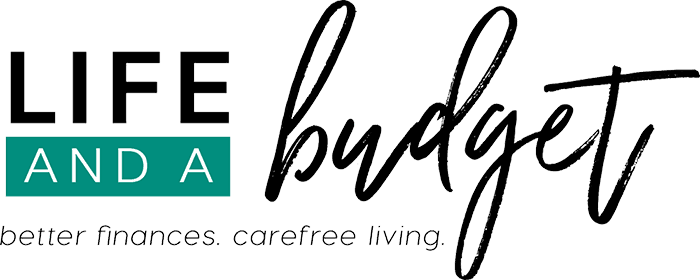 Are you a one-income household struggling and wondering how to get ahead financially? You could be a two-parent household with one significant other at home and it seems like you can never get ahead on your bills. Or maybe you’re a single mom who is living paycheck to paycheck? Regardless of the circumstances, you’re looking for the same thing – tips on living on one income.
Are you a one-income household struggling and wondering how to get ahead financially? You could be a two-parent household with one significant other at home and it seems like you can never get ahead on your bills. Or maybe you’re a single mom who is living paycheck to paycheck? Regardless of the circumstances, you’re looking for the same thing – tips on living on one income.
If this sounds familiar and you want to get ahead despite having very little money to work with, this article will teach you how to get ahead on bills even when it doesn’t seem like its possible.
In this article, we’ll use a monthly budget for a single mom as an example, but just know – this budget can work for one-income homes too! There are plenty of helpful tips on how to get ahead on bills when you are behind. So, grab a notebook and pen so you can take notes on how to get a month ahead on little income.
Why would someone want to get a month ahead on bills?
If you’re living paycheck to paycheck or managing life on one income, saving a full month’s worth of income will alleviate the burden of waiting for each paycheck to come before determining your budget for the month.
You wouldn’t nervously have to wait on your paycheck to hit your account so you could pay your car note.
Matter of fact, you would be putting yourself in a position to forget all about payday because each month you would create a budget based on the amount you earned last month. Essentially, you’d be living on last month’s income. A great tool to learn how to successfully budget is the LAAB Budget Binder.
Related Reading:
Get a Discounted Prime Membership and Save Even More!
The Top 13 Ways You Can Earn Free Gift Cards
Earn More Cash: 21+ Ways to Add $150 to Your Budget
A Story of How a Single Mom Living Paycheck to Paycheck Can Help You Get Ahead
I like telling stories, so allow me to introduce you to Terri so she can show you how to get ahead in life financially.
Terri is a single thirty-year-old mother of two. Her monthly take-home income (after taxes, insurance, and retirement) is $2,100 a month and she is paid on the 1st and the 15th.
This means twice a month Teri brings home $1,050. She waits on pins and needles for payday to come because she has to pay her $700 rent out of her 15th paycheck so it will be paid on time.
This leaves her with $250 until the first, and this is easily spent on food and utilities. She has no car payment; however, her car is in need of repairs. She wants to set money aside for the expense, but she has to pay childcare.
Here is how this single mom’s budget works out:
Paycheck 1: $1,050
Monthly Expenses:
Phone bill – $50
Childcare $600
Gas – $75
Car repairs – $0.00
Student Loan Payment – $300
Misc – $25
Paycheck 2: $1,050
Monthly Expenses:
Rent payment: $700
Electricity: $100
Groceries: $200
Water: $50
Total: $2,100
As you can see, Teri only has $25.00 leftover each month for miscellaneous expenses. If one of her boys were to get sick and needed to go to the doctor, a $10 co-pay would eat up a portion of what’s leftover.
If he has to go to the doctor, he’s probably going to need medicine. This would leave her without any money for the remainder of the month.
Teri can’t afford to have a sick child, her car breaks down, or a higher than usual electricity bill. These types of setbacks are what cause people to go into debt.
I’m pretty sure there is plenty of credit card offers filling up her mailbox and a payday or title loan is probably located nearby. This is not a recipe for success.
How to Get Ahead Financially When You Are Behind?
If you are barely making enough money to keep the lights on and food on the table, I understand how it could be tough to think about getting ahead on bills.
A paycheck to paycheck life is vicious and don’t think I haven’t walked a mile or two in these shoes before. It’s tough, but simple changes can create big results!
Let’s continue using Terri as an example. There are some positive things that happen to her each month financially, so let’s explore them…
Savings on Gas – Terri knows her car could die at any moment. To make sure she’s prepared, she’s already researched alternative (and affordable) ways to get to work every day.
Even though she budgets $75.00 for gas each month, sometimes she doesn’t need that much. She and a co-worker agreed to split carpooling together to extend the life of their vehicles since they live in the same complex.
Carpooling – If one of their cars die, she is prepared to take city transportation and her co-worker has other arrangements. Every other day she takes her co-worker to work and the co-worker returns the favor.
They both realize their situation could change at any moment. Therefore, they use this opportunity to pocket the money they are saving on gas.
Terri ends up using an average $50 to $65 of her gas each month so she saves the $10 to $25 savings. For this example, let’s say for the next six months Terri is able to save $120.
It might not seem like much, but she has the right mindset. She is saving something no matter how small it is.
Savings on Electricity and Food – Terri also focuses on ways to lower her electricity bill. She unplugs all unused items and adjusts her thermostat for maximum savings. Check out the tips in the last section on how Terri might be eligible for energy payment assistance.
She creates meal plans and prepares her family’s lunches every day. Again, the savings seem small; however, they are huge wins for her. If you need help reducing your food costs, check out some of the following:
22 Meatless Meals on a Budget (That You’ll Actually Enjoy!)
23 Quick and Cheap Meals To Feed The Family For Under $6
Vegan Grocery List on a Budget: Simple Meals and Big Savings!
How You and Your Family Can Eat Healthy on a Budget
Earning Extra Income – Last, Terri babysits her brother’s children on the weekends while he works. Her brother pays her $75 per week and sends food for his kids so he won’t add to her expenses. This brings in an additional $300 per month.
After doing this for a few months, she has saved enough for her expected car repairs and is well on her way to creating a buffer that will eventually become a month’s worth of income.
This is how Terri plans to stop living paycheck to paycheck. She keeps her expenses low, lives frugally, and brings in whatever extra income to help her get ahead financially without getting further behind. To learn how you can make additional money, check out this post.
Tips for Living on One Income or a Tight Budget:
- You have to shop for food anyway so you might as well receive something in return for it. This app allows you to receive cashback rebates on things like eggs, milk, produce and other food items. Get a $10.00 bonus just for trying the Ibotta app using this link!
- Shop online using Rakuten (Formerly Ebates). Rakuten is perfect if you do a lot of shopping online and you want to boost your savings. You can use this in conjunction with online coupons too! Here’s my full review of Rakuten. If you’re new to Ebates, you can receive a free $10 gift card to a retailer of your choice when you make your first $25 purchase. Sign up for Rakuten and start saving money!
- Did you know that you may qualify for the Amazon Prime Discounted program? Prime is just $5.99 per month for qualifying customers in select U.S. government assistance programs, such as holders of an EBT card. If you receive assistance, sign up using this link for the free trial and more info on how to receive the discount and start saving on your online shopping.
- If student loan refinancing is suitable for your situation, check out Credible and fill out their quick questionnaire and compare up to 12 different lenders to see if you can qualify for a lower interest rate or even a lower payment.
- Sign up for Swagbucks and refer everyone! You even get Swagbucks for their Swagbucks (if that makes any sense). And don’t forget to verify your email so you can get your $5 sign-up bonus too! I use Swagbucks to afford little extras like Kindle e-books and toys for my kids. You can cash your Swagbucks out for as little as $3 or $5 Amazon gift cards.
Does getting a month ahead of your bills replace your emergency fund?
Absolutely not.
Getting a month ahead of your expenses only creates a mini emergency fund in your checking or savings account so you won’t continue to live paycheck to paycheck.
However, you still need an emergency fund because regardless of being a month ahead, a serious emergency could still cause you to go into debt.
Consider this…
After six months, Terri has managed to gather $1,800 from watching her nieces and she’s saved $120 in gas costs.
This gives her a total savings of $1,920. She went ahead and had the necessary repairs made on her car which cost a total of $700. This brings her savings down to $1,220.
She continues to save her babysitting money for another two months ($600), saves on gas ($40), and saves from her reduced electricity bill ($150). This leaves her with $2,010. She’s only $90 away from being one month ahead.
This is great, but what if Terri got hurt at work and was disabled for four weeks? Her disability insurance would only provide her with half of her income, $1050.
This means she would have to live on the amount she saved just to meet her expenses for the following month. If she had an emergency fund, she wouldn’t have anything to worry about.
Basically, regardless of being a month ahead, an emergency fund will keep you from going back to living paycheck to paycheck.
Terri should continue to save so she will have a healthy emergency fund and still be able to be a month ahead of her expenses. Her buffer is simply a starting point.
Which one should I save up for first? Emergency fund or a buffer?
Honestly, it doesn’t matter. They both are essentially the same thing! Your buffer is simply a mini emergency fund that you keep nearby so you can pay this month’s expenses off of last month’s income.
Of course, if you had a true emergency, using the money in your buffer account would be better than going into debt. Therefore, the buffer is an emergency fund of sorts.
I’m encouraging you to go a bit further, though. As mentioned previously, with Terri’s situation, she is still only one paycheck from being right back where she started.
This is even with the month’s worth of income she’s managed to save. Being out of work or becoming unemployed would result in her starting from square one.
For more info about emergency funds, you’ll want to check out this post.
What tools can I use to help me get ahead financially?
An easy way to determine if you’re making progress towards getting ahead is to use a budgeting and expense software. If you don’t like using those, pen and paper would be fine too.
Here is how I was able to determine we had a decent sized buffer in our checking account:
- I kept a list of all of our expenses.
- I totaled the amount we brought home each month.
- Once all of our bills were paid for the month, I looked at the remaining balance (before the next paycheck arrived). This was the amount of our buffer (month ahead fund).
Once all of our bills were paid, we were left with $1,300 one month.
This is not an entire month’s worth of expenses for us; however, it let me know we were headed in the right direction of living off of the income we earned last month.
To further track my progress I tried EveryDollar during their 15 day trial period to see if it would be easier to keep up with the amount of our buffer.
I simply put in our monthly household budget and linked up our household bank account. EveryDollar tracked all the expenses coming from our account and we tracked bills as they were paid.
Ultimately, I decided not to pay for a year’s service on this software, but it did affirm my belief that we were indeed staying on track to getting a month ahead.
I still use the free version to keep an electronic version of our budget and it’s pretty easy to use if you want to check it out.
It was $99 for one year (the main reason I decided not to keep the full version). There are other free versions such as Mint.
More Tips on How to Get Ahead Financially…
A few other tips for living on one income and saving up a month’s expenses:
- Throw any extra money towards your debt and get rid of it. Check out this article: Get Out Of Debt Tips You Absolutely Need To Know!
- Do one new frugal thing every day!
- Use eBay or Craigslist to sell unwanted items.
- Learn the skills you need to become a successful online proofreader.
- Sign up to become a deliver for Instacart.
- You can become a food delivery driver with Doordash.
- Or perhaps deliver groceries with Shipt, the pay is amazing!
- Learn how to become a seller on Amazon.
- Take surveys to make extra cash.
- Barter (exchange services or skills you possess for other services or products you may need).
- Pick up a seasonal job, part-time work, or one day gig.
- Sell old broken jewelry for cash.
- If you’re single and have the opportunity to house sit for extended periods of time, ditch your rent!
- Use public transportation.
- Tutor online or in-person.
- Freelance offline or online (graphic design, writing, social media management, virtual assistant etc).
- Save your tax refund.
- Save your work bonuses.
- If you are paid bi-weekly, this means you receive two extra checks per year if you use a bi-weekly budget. Use it wisely.
- Check out this page to see if your local area or county has energy assistance programs that can help reduce the cost of your energy bills.
***Update 5/23/2018 – A reader kindly suggested in the comment areas that your local cable company may offer reduced internet services at around $5 or $10 and affordable laptop purchases in an effort to make sure no child is left behind (depending on eligibility). Check out this page for more information.
Finally, a plan on how to get ahead on bills…
Getting a month ahead on bills while living on a low income is not an easy thing to do, but with determination and the right mindset, it is possible. Now it’s all on you.
Figure out a strategy that will help you get a month ahead financially and put it into action. After you get a month ahead and you’re no longer living paycheck to paycheck, you’ll be so happy you decided to make the effort.
Grab the FREE get a month ahead printables here.




